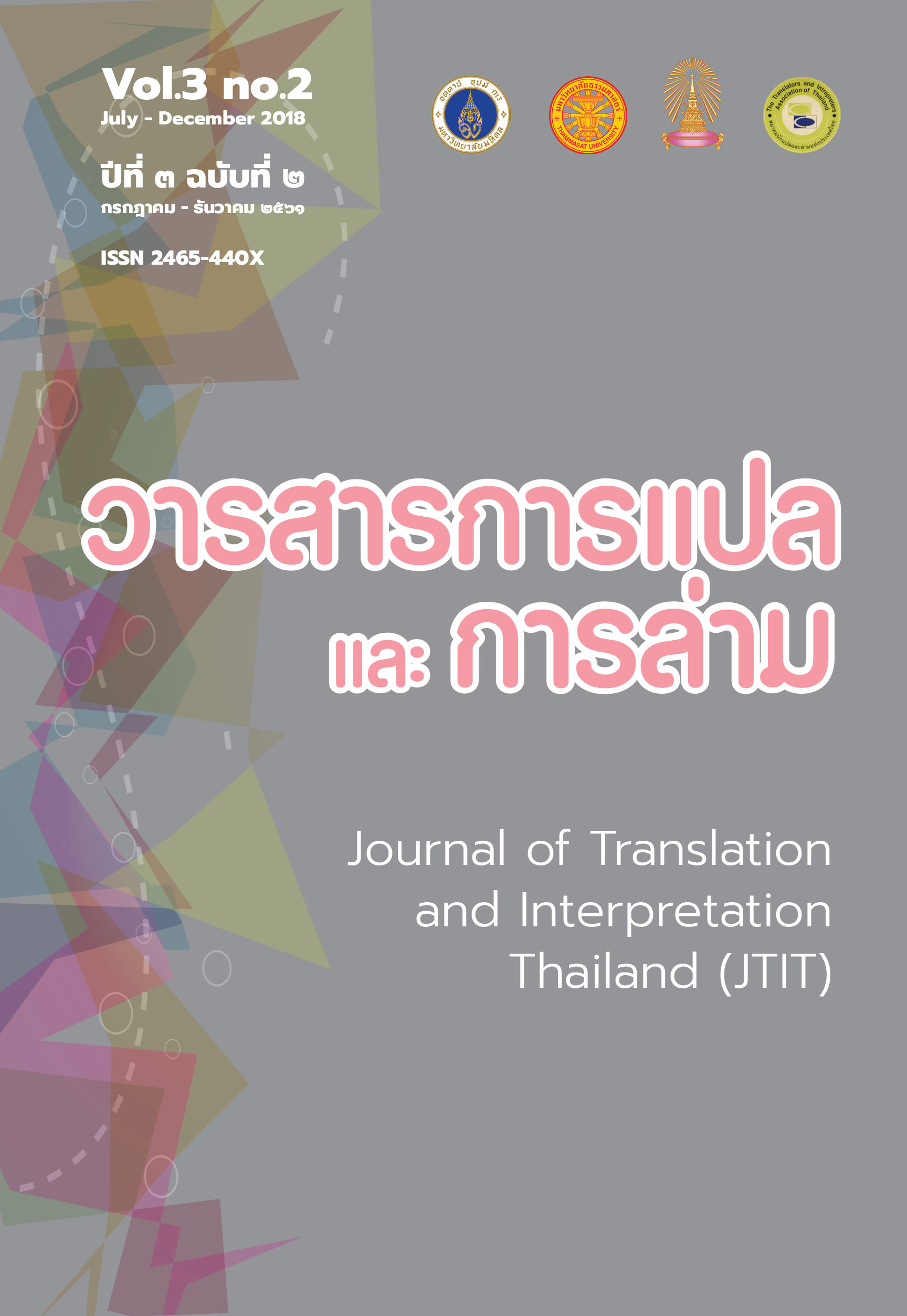ความแตกต่างทางวัฒนธรรมยุโรปและวัฒนธรรมไทย ที่มีผลต่อการทำล่ามในบริบทของงานสถานทูต
Main Article Content
บทคัดย่อ
บทความนี้มีวัตถุประสงค์เพื่อศึกษาประเด็นปัญหาด้านความแตกต่างทางวัฒนธรรมที่เป็นความท้าทายของเจ้าหน้าที่สถานทูตคนไทยผู้ปฏิบัติหน้าที่ล่าม วิธีรับมือกับปัญหา และ ความเข้าใจและความคาดหวังของเจ้าหน้าที่สถานทูตชาวต่างชาติต่อบทบาทการทำหน้าที่ของล่าม โดยใช้วิธีการเก็บข้อมูลจากการสัมภาษณ์เจ้าหน้าที่สถานทูตประเทศจากทวีปยุโรปประจำประเทศไทย ประกอบด้วยเจ้าหน้าที่คนไทยผู้ปฏิบัติหน้าที่ล่าม 6 คน และเจ้าหน้าที่สถานทูตชาวต่างชาติซึ่งมีประสบการณ์ทำงานร่วมกับเจ้าหน้าที่คนไทยผู้ปฏิบัติหน้าที่ล่าม 3 คน
ผลการศึกษาพบว่า ล่ามแต่ละคนมีวิธีการรับมือกับปัญหาที่แตกต่างกันซึ่งปรับเปลี่ยนไปตามสถานการณ์ ไม่ว่าจะเป็นการอธิบาย เสริมความ หรือแม้กระทั่งการตัดหรือข้ามข้อความดังกล่าวทิ้งไป และในมุมมองของเจ้าหน้าที่ชาวต่างชาติส่วนมากเห็นว่าวิธีการอธิบายชี้แจงเพื่อสร้างความกระจ่างให้แก่ผู้ฟังนั้นเป็นสิ่งที่ยอมรับได้ แต่อย่างไรก็ดี ล่ามควรหยิบยกประเด็นที่อาจก่อให้เกิดปัญหานั้นขึ้นมาพูดคุยตกลงกับผู้พูดก่อนหน้าการประชุมเพื่อที่ว่าผู้พูดจะเชื่อมั่นได้ว่าล่ามจะถ่ายทอดข้อความให้เป็นไปตามวัตถุประสงค์ที่ผู้พูดตั้งไว้ได้
Article Details
เอกสารอ้างอิง
Adler, N. S. (1997). International dimensions of organizational behavior. Cincinnati: South-Western College Publishing.
Baranyai, T. (2011). The role of translation and interpretation in the diplomatic communication. SKASE Journal of Translation and subsidiary in China. Retrieved from http://www.divaportal.org/smash/get/diva2:344618/FULLTEXT01.pdf
Hooker, J. (2008). Cultural differences in business communication. Retrieved from https://public.tepper.cmu.edu/jnh/businessCommunication.pdf
Jolly, R. (2008). Chinese vs. European views regarding technology assessment: Convergent or Divergent? Technovation, 28(12), 818-830.
Kaufman, S. (2006). The Interpreter as Intervener. In A. Schneider & C.Honeyman (Eds.), The Negotiator's Fieldbook, 535-546. Washington, DC: American Bar Association, Section of Dispute Resolution.
Kucerova, H. (1990). Diplomatic interpreting in Czechoslovakia. In Interpreting Yesterday, Today, and Tomorrow. ATA Scholarly Monograph Series (Vol. 4), 37-39. Amsterdam: John Benjamins.
Kurbalija J., & Slavik, H. (2001). Language and diplomacy. Retrieved from http://site.iugaza.edu.ps/wmodallal/files/2010/02/Language_and_Diplomacy.pdf
Lewis, B. (2001). What went wrong? Western impact and Middle Eastern response. Oxford: Oxford University Press. Interpretation, 5(2). Retrieved from http://www.skase.sk/Volumes/JTI06/pdf_doc/01.pdf
Gercek, S. E. (2008). Cultural mediator or scrupulous translator? Revisiting role, context and culture in consecutive conference interpreting. Retrieved from
https://www.arts.kuleuven.be/cetra/papers/files/eraslan-gercek.pdf
Gesteland, R. (2002). Cross-cultural business behavior. Copenhagen: Copenhagen Business School Press.
Hall, E. T. (1976). Beyond culture. New York: Doubleday Dell Publishing.
He, R., and Liu J. (2010). Barriers of cross-cultural communication in multinational firms – A case study of Swedish company and its
Newman, K. L. & Nollen, S. D. (1996). Culture and congruence: The fit between management practices and national culture. Journal of International Business Studies, 27(4), 753-779.
Nick, S. (2001). Use of language in diplomacy. In Language and diplomacy, 39-48. Malta: DiploProjects.
Pistillo, G. (2002). The interpreter as cultural mediator. Intercultural Communication, 6. Retrieved from https://www.immi.se/intercultural/nr6/pistillo.pdf
Pöchhacker, F. (2004). Introducing interpreting studies. New York: Routledge.
Pöchhacker, F. (2008). Interpreting as mediation. In C. Valero Garcés & A. Martin (Eds.), Crossing borders in community interpreting: Definitions and dilemmas, 9-26. Philadelphia: John Benjamins.
Reischlová, D. (2012). Interpreters within the realm of international relations - Role, power, ethical standards and responsibility (Master’s diploma thesis). Brno, Czech Republic: Masaryk University.
Sriussadaporn, R. (2006). Managing international business communication problems at work: A pilot study in foreign companies in Thailand. Cross-Cultural Management: An International Journal, 13(4), 330-344.
The Australian Institute of Interpreters and Translators INC. (2012). AUSIT Code of Ethics and Code of Conduct. Retrieved from http://ausit.org/AUSIT/Documents/Code_Of_Ethics_Full.pdf
Welch, D. & Welch, L. (2008). The importance of language in international knowledge transfer. Management International Review, 48(3), 339-360.
Weller, G. (2004). An exercise in the organization of interpreting services at high-level diplomatic conferences. ATA Chronicle, 36-39.
Working with Interpreters Guidelines. (2007). Retrieved from http://www.health.qld.gov.au/multicultural/interpreters/guidelines_int.pdf
Ybema, S. & Byun, H. (2009). Cultivating culture differences in asymmetric power relations. Cross-Cultural Management, 9(3), 339-358.


